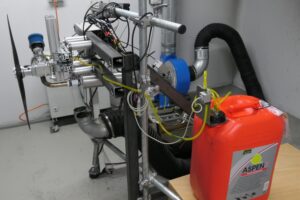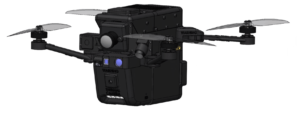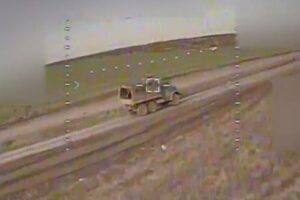TEKEVER Unveils ARX Drone with Swarm Capabilities
European unmanned systems manufacturer, TEKEVER, presents a new drone capable of deploying a swarm of smaller drones, set to enhance surveillance and rescue missions. At the Xponential 2024 expo, TEKEVER, a European provider of unmanned aerial systems, introduced the ARX, a new drone that features the ability to deploy and coordinate a swarm of smaller […]
The post TEKEVER Unveils ARX Drone with Swarm Capabilities appeared first on DRONELIFE.
Nearthlab Unveils Advanced Drone Technology at AUVSI Xponential
South Korean Firm to Showcase Cutting-Edge Counter-UAS and AI-Driven Solutions in San Dieg After demonstrating their AI-driven technology at Drone Show Korea, South Korea-based autonomous drone solutions provider Nearthlab is gearing up to display its latest counter-UAS technology at this year’s AUVSI Xponential, held this week at the San Diego Convention Center. The centerpiece of […]
The post Nearthlab Unveils Advanced Drone Technology at AUVSI Xponential appeared first on DRONELIFE.
Dedrone Achieves SAFETY Act Designation by the Department of Homeland Security
The company becomes the only counter-drone firm recognized under the SAFETY Act for its advanced security technology. Dedrone, a prominent player in smart airspace security, has been granted the SAFETY Act Designation by the Department of Homeland Security’s Office of SAFETY Act Implementation (OSAI). This recognition marks Dedrone as the first counter-drone company to receive […]
The post Dedrone Achieves SAFETY Act Designation by the Department of Homeland Security appeared first on DRONELIFE.
AUVSI and DIU Sign MOU on Drone Cybersecurity
The memorandum aims to integrate certified drone components into the Blue UAS Framework list. The Association for Uncrewed Vehicle Systems International (AUVSI) and the Defense Innovation Unit (DIU) announced a new Memorandum of Understanding (MOU) at the XPONENTIAL 2024 conference. The agreement sets a framework for drone component manufacturers holding Green UAS certification to share […]
The post AUVSI and DIU Sign MOU on Drone Cybersecurity appeared first on DRONELIFE.
SAFETY Act: which drone companies have Designation status
In the slew of government programs designed to award technology companies with approvals on products that help supports the U.S. government’s efforts to fight terrorism comes another wild acronym. It’s called the Support Anti-Terrorism by Fostering Effective Technologies Act, dubbed ‘SAFETY’ for short. The goal of the SAFETY Act? To incentivize private companies to develop and deploy anti-terrorism technologies.
The SAFETY Act, which is conducted through the Department of Homeland Security (DHS), has been around since 2002. Yet, it only just now has added a drone-related to company to its list. That award goes to Dedrone, which is a counterdrone company that bills itself as the world’s leader in smart airspace security. And in fact, the DHS’s granting of Designation Status to Dedrone makes Dedrone currently the first and only counter-drone company currently acknowledged under the SAFETY Act.
On Tuesday, Dedrone announced it had received Designation status from the DHS Office of SAFETY Act Implementation. That mouthful of a phrase has its own acronym of OSAI. OSAI granted Designation status to a few Dedrone products, including Dedrone’s command-and-control (C2) platform, called DedroneTracker.AI, and its DedroneSensor radio frequency (RF) sensors.
Dedrone builds a range of products now used in 32 different countries and five of the G-7 nation governments. Dedrone’s tech relies on artificial intelligence and machine learning to continuously ‘interrogate’ and ‘verify’ drones. With it, Dedrone tech ensures only drones allowed to be in the airspace are the ones flying there. As a Dedrone customer, you’ll be able to easily detect, track, identify, analyze and mitigate those rogue drones.
In total, you’ll find Dedrone at more than 800 sites, including more than 100 combined airports and stadiums.
How to earn SAFETY Act designation
To earn Designation status from the DHS OSAI, companies must demonstrate the effectiveness of their technology. Companies can demonstrate that either through rigorous operational testing or examples of prior use. Upon earning Designation, products that have such status receive a liability cap as well as exclusive action in Federal court, no joint and several liability for non-economic damages, and no punitive damages or prejudgment interest.
Dedrone is able to maintain that Desgination status through April 30, 2029. That means Dedrone technology deployed from now until April 30, 2029 is protected for the lifetime of its deployment.
And having such a designation is pretty rare. Another drone company called Drone Go Home received a similar, albeit far-lesser DHS Designation in August 2019. Drone Go Home builds a passive radio frequency-based sensor and alert system, designed to detect and locate drones. But their product only received what’s called Developmental Testing & Evaluation designation. That status comes with the expectation that the company will pass the testing and development stage (upon which they’d reach full Desgination status). Alas, Drone Go Home did not do that, and their DTE designation expired on March 30, 2023.
Why Dedrone’s Designation status matters for drones

The DHS award of Designation status certainly gives Dedrone a leg up in the drone industry against its competitors in the anti-drone space.
This designation provides significant benefits to companies like Dedrone that have received such status, including:
- Limited liability in case of a terrorist incident where their technology is used.
- Reimbursement for certain costs associated with defending lawsuits.
- Government endorsement, which can boost marketability.
But it also suggests that the drone industry is worth paying more attention to. Today’s news is a clear indication that the DHS sees airspace security from potentially harmful drones as a critical part of its anti-terrorism security apparatus.
To date, the DHS has approved more than 1,000 anti-terrorism technologies for coverage under the SAFETY Act. To date, though, only one fits the counter-drone landscape.
But that doesn’t mean more drone companies couldn’t qualify in the future. The Dedrone announcement suggests there is room for more technologies to earn SAFETY Act approval. That could include:
- Drone detection systems that identify and track unauthorized drones.
- Counter-drone technologies that can disable or take control of malicious drones.
- Security drones equipped with surveillance or inspection capabilities for critical infrastructure.
For drone manufacturers and developers interested in learning more about the SAFETY Act and QATT designation, visit the official DHS SAFETY Act website.
The post SAFETY Act: which drone companies have Designation status appeared first on The Drone Girl.
12 B-2s Conduct Massive Fly-Off, Elephant Walk
 The 509th and 131st Bomb Wings capped off the most recent iteration of Exercise Spirit Vigilance by performing a mass fly-off of 12 B-2 Spirit stealth bombers April 15, 2024, at Whiteman Air Force Base. Spirit Vigilance is one of a series of routine exercises held by Air Force Global Strike bases across the Air […]
The 509th and 131st Bomb Wings capped off the most recent iteration of Exercise Spirit Vigilance by performing a mass fly-off of 12 B-2 Spirit stealth bombers April 15, 2024, at Whiteman Air Force Base. Spirit Vigilance is one of a series of routine exercises held by Air Force Global Strike bases across the Air […]Sky Power International Runs Successful FAR33 Endurance Tests
 Propulsion systems in unmanned aerial vehicles (UAVs) must be highly reliable, as the motors are mission-critical components. A proof of reliability is therefore important and is required by every engine manufacturer. Sky Power GmbH therefore tested its SP-110 FI TS GEN and SP-210 FI TS GEN to demonstrate its endurance and reliability with a highly […]
Propulsion systems in unmanned aerial vehicles (UAVs) must be highly reliable, as the motors are mission-critical components. A proof of reliability is therefore important and is required by every engine manufacturer. Sky Power GmbH therefore tested its SP-110 FI TS GEN and SP-210 FI TS GEN to demonstrate its endurance and reliability with a highly […]Orion Technology Group Integrates Doodle Labs Datalinks into X BLUE NANO Drones
 Orion Technology Group, a manufacturer of advanced artificial intelligence UxVs and mission software, has announced the integration of Doodle Labs’ cutting-edge Mesh Rider Radios into its full line of AIM BLUE drones, including its newest X2 BLUE NANO, a cargo pocket-sized nUAS with indoor and outdoor autonomous navigation capabilities. Orion’s Artificial Intelligence Mission (AIM) system […]
Orion Technology Group, a manufacturer of advanced artificial intelligence UxVs and mission software, has announced the integration of Doodle Labs’ cutting-edge Mesh Rider Radios into its full line of AIM BLUE drones, including its newest X2 BLUE NANO, a cargo pocket-sized nUAS with indoor and outdoor autonomous navigation capabilities. Orion’s Artificial Intelligence Mission (AIM) system […]Ukraine’s New FPV Drones have Improved Speed of 150 km/h
 FPV-drones capable of flying at a speed of about 150 kilometers per hour appeared in service with the Defense Forces of Ukraine. The footage released shows pilots from the Erebus Group unit of the Strike Unmanned Aerial Systems Company, which is part of the 82nd Air Assault Brigade, effortlessly closing in on enemy vehicles. “Something […]
FPV-drones capable of flying at a speed of about 150 kilometers per hour appeared in service with the Defense Forces of Ukraine. The footage released shows pilots from the Erebus Group unit of the Strike Unmanned Aerial Systems Company, which is part of the 82nd Air Assault Brigade, effortlessly closing in on enemy vehicles. “Something […]